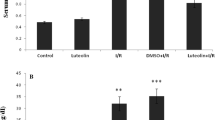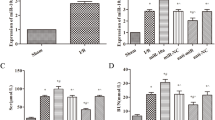Abstract
Background
Renal denervation (RDN) has been used to promote kidney injury repair, whereas miRNAs have been found to be involved in the pathophysiology of renal injury. However, the miRNA alterations that occur after RDN and the related protective mechanisms remain to be determined.
Methods
Renal ischemic reperfusion injury (IRI) rat model was established and RDN was performed. Animals were killed at 24 h and 2 weeks following the operation. Tyrosine hydroxylase (TH) levels, renal function, tubular cell apoptosis and histological sections were examined at 24 h, whereas renal fibrosis and capillary vessels were assessed at 2 weeks. Furthermore, the expression of miRNAs in the injured kidney was determined using micro-array and the target genes were analyzed.
Results
We found that TH was eliminated and that renal function was improved in the denervation group at 24 h. RDN reduced tubular cell apoptosis and mitigated the histological lesion. Furthermore, an increase of capillary vessel density and reduction of renal fibrosis were observed after 2 weeks. Moreover, the numbers of miRNAs were up-regulated after RDN treatment, and the miRNAs targeted pro-angiogenic, anti-fibrotic and inflammatory pathways.
Conclusions
RDN is a reliable method for alleviating IRI-induced acute and chronic kidney injury, and modulating the miRNA-related pro-angiogenic, anti-fibrotic or inflammatory pathways involved in this process.






Similar content being viewed by others
Data availability
The datasets used and/or analyzed during the current study are available from the corresponding author on reasonable request.
References
Sykes E, Cosgrove JF. Acute renal failure and the critically ill surgical patient. Ann R Coll Surg Engl. 2007;89(1):22–9.
Ishani A, Xue JL, Himmelfarb J, Eggers PW, Kimmel PL, Molitoris BA, Collins AJ. Acute kidney injury increases risk of ESRD among elderly. J Am Soc Nephrol. 2009;20(1):223–8.
Eikelis N, Hering D, Marusic P, Sari C, Walton A, Phillips S, Lambert E, Duval J, Krum H, Lambert G, et al. The effect of renal denervation on endothelial function and inflammatory markers in patients with resistant hypertension. Int J Cardiol. 2015;188:96–8.
Fujii T, Kurata H, Takaoka M, Muraoka T, Fujisawa Y, Shokoji T, Nishiyama A, Abe Y, Matsumura Y. The role of renal sympathetic nervous system in the pathogenesis of ischemic acute renal failure. Eur J Pharmacol. 2003;481(2–3):241–8.
Kannan A, Medina RI, Nagajothi N, Balamuthusamy S. Renal sympathetic nervous system and the effects of denervation on renal arteries. World J Cardiol. 2014;6(8):814–23.
Barajas L, Liu L, Powers K. Anatomy of the renal innervation: intrarenal aspects and ganglia of origin. Can J Physiol Pharmacol. 1992;70(5):735–49.
Kopp UC, Cicha MZ, Smith LA, Mulder J, Hokfelt T. Renal sympathetic nerve activity modulates afferent renal nerve activity by PGE2-dependent activation of alpha1- and alpha2-adrenoceptors on renal sensory nerve fibers. Am J Physiol Regul Integr Comp Physiol. 2007;293(4):R1561-1572.
Kopp UC, Cicha MZ, Smith LA, Ruohonen S, Scheinin M, Fritz N, Hokfelt T. Dietary sodium modulates the interaction between efferent and afferent renal nerve activity by altering activation of alpha2-adrenoceptors on renal sensory nerves. Am J Physiol Regul Integr Comp Physiol. 2011;300(2):R298-310.
Kopp UC. Role of renal sensory nerves in physiological and pathophysiological conditions. Am J Physiol Regul Integr Comp Physiol. 2015;308(2):R79-95.
Krum H, Schlaich M, Whitbourn R, Sobotka PA, Sadowski J, Bartus K, Kapelak B, Walton A, Sievert H, Thambar S, et al. Catheter-based renal sympathetic denervation for resistant hypertension: a multicentre safety and proof-of-principle cohort study. Lancet. 2009;373(9671):1275–81.
Kim J, Padanilam BJ. Renal nerves drive interstitial fibrogenesis in obstructive nephropathy. J Am Soc Nephrol. 2013;24(2):229–42.
Xiao L, Kirabo A, Wu J, Saleh MA, Zhu L, Wang F, Takahashi T, Loperena R, Foss JD, Mernaugh RL, et al. Renal denervation prevents immune cell activation and renal inflammation in angiotensin II-induced hypertension. Circ Res. 2015;117(6):547–57.
Salman IM, Ameer OZ, Sattar MA, Abdullah NA, Yam MF, Najim HS, Khan AH, Johns EJ. Role of the renal sympathetic nervous system in mediating renal ischaemic injury-induced reductions in renal haemodynamic and excretory functions. Pathology. 2010;42(3):259–66.
Liu Y, Liu B, Liu Y, Chen S, Yang J, Liu J, Sun G, Bei WJ, Wang K, Chen Z, et al. MicroRNA expression profile by next-generation sequencing in a novel rat model of contrast-induced acute kidney injury. Ann Transl Med. 2019;7(8):178.
Sun T, Liu Y, Liu L, Ma F. MicroRNA-544 attenuates diabetic renal injury via suppressing glomerulosclerosis and inflammation by targeting FASN. Gene. 2019;2019:143986.
Wang J, Li H, Qiu S, Dong Z, Xiang X, Zhang D. MBD2 upregulates miR-301a-5p to induce kidney cell apoptosis during vancomycin-induced AKI. Cell Death Dis. 2017;8(10):e3120.
Rudnicki M, Perco P, DH Leierer Heinzel Muhlberger Schweibert Sunzenauer Regele Kronbichler BJAINJHA, et al. Renal microRNA- and RNA-profiles in progressive chronic kidney disease. Euro J Clin Investigation. 2016;46(3):213–26.
Zou YF, Wen D, Zhao Q, Shen PY, Shi H, Zhao Q, Chen YX, Zhang W. Urinary MicroRNA-30c-5p and MicroRNA-192-5p as potential biomarkers of ischemia-reperfusion-induced kidney injury. Exp Biol Med. 2017;242(6):657–67.
Zou X, Gu D, Zhang G, Zhong L, Cheng Z, Liu G, Zhu Y. NK cell regulatory property is involved in the protective role of MSC-derived extracellular vesicles in renal ischemic reperfusion injury. Hum Gene Ther. 2016;27(11):926–35.
Kim J, Padanilam BJ. Renal denervation prevents long-term sequelae of ischemic renal injury. Kidney Int. 2015;87(2):350–8.
Zou X, Gu D, Xing X, Cheng Z, Gong D, Zhang G, Zhu Y. Human mesenchymal stromal cell-derived extracellular vesicles alleviate renal ischemic reperfusion injury and enhance angiogenesis in rats. Am J Transl Res. 2016;8(10):4289–99.
Zou XY, Yu Y, Lin S, Zhong L, Sun J, Zhang G, Zhu Y. Comprehensive miRNA analysis of human umbilical cord-derived mesenchymal stromal cells and extracellular vesicles. Kidney Blood Press Res. 2018;43(1):152–61.
Lu J, Miao JG, Sun JH. LncRNA np_5318 promotes renal ischemia-reperfusion injury through the TGF-β/Smad signaling pathway. Exp Ther Med. 2020;19(4):2833–40.
Zhang S, Xu XZ, Huang YH, Sun SY, Jin CQ, Ji H, Sun D, Xia AZ. Anisodamine ameliorates ischemia reperfusion-induced renal injury in rats through activation of the extracellular signal-regulated kinase (ERK) pathway and anti-apoptotic effect. Exp Ther Med. 2020;19(4):2833–40.
Zhang NW, Zheng QM, Wang YD, Lin J, Wang H, Liu R, Yan MR, Chen XF, Yang JH, Chen XL. Renoprotective effect of the recombinant anti-IL-6R fusion proteins by inhibiting JAK2/STAT3 signaling pathway in diabetic nephropathy. Front Pharmacol. 2021;12:681424.
Andrea SN, Rosalba PV, Adrian RM, Miguel AMR, Jesus RA, Norma G, Mara CB, Gerardo G, Felix RT, Norma AB. Vegfa promoter gene hypermethylation at HIF1α binding site is an early contributor to CKD progression after renal ischemia. Sci Rep. 2021;11(1):8769. https://doi.org/10.1038/s41598-021-88000-5.
Wei S, Li D, Zhang Y, Su L, Zhang Y, Wang Q, Yang D, Li, YangMa YS. Perivascular radiofrequency renal denervation lowers blood pressure and ameliorates cardiorenal fibrosis in spontaneously hypertensive rats. PLoS One. 2017;12(4):e0176888.
Ledeganck KJ, Gielis EM, Abramowicz D, Stenvinkel P, Shiels PG, Van Craenenbroeck AH. MicroRNAs in AKI and kidney transplantation. Clin J Am Soc Nephrol. 2019;14(3):454–68.
Tang F, Pacheco MTF, Chen P, Liang D, Li W. Secretogranin III promotes angiogenesis through MEK/ERK signaling pathway. Biochem Biophys Res Commun. 2018;495(1):781–6.
Meng XM, Tang PM, Li J, Lan HY. TGF-beta/Smad signaling in renal fibrosis. Front Physiol. 2015;6:82.
Zhang XL, Topley N, Ito T, Phillips A. Interleukin-6 regulation of transforming growth factor (TGF)-beta receptor compartmentalization and turnover enhances TGF-beta1 signaling. J Biol Chem. 2005;280(13):12239–45.
Jones SA, Fraser DJ, Fielding CA, Jones GW. Interleukin-6 in renal disease and therapy. Nephrol Dial Transplant. 2015;30(4):564–74.
Funding
This study is supported by grants from the National Natural Science Foundation of China (No.81900618; 81871149; 8601267) and the Shanghai Sailing Program (18YF1415000).
Author information
Authors and Affiliations
Corresponding authors
Ethics declarations
Conflict of interest
The authors declare that they have no conflict of interest.
Ethical approval
In this study, all works involving animals were in accordance with the animal use protocol enacted by the Institutional Animal Care and Use committees of School of Medicine, Shanghai Jiao Tong University (SCMCIACUC-K2019042).
Consent for publication
Not applicable.
Additional information
Publisher's Note
Springer Nature remains neutral with regard to jurisdictional claims in published maps and institutional affiliations.
Supplementary Information
Below is the link to the electronic supplementary material.
About this article
Cite this article
Zou, X., Lin, S., Zhong, L. et al. Renal denervation alleviates renal ischemic reperfusion injury-induced acute and chronic kidney injury in rats partly by modulating miRNAs. Clin Exp Nephrol 26, 13–21 (2022). https://doi.org/10.1007/s10157-021-02129-1
Received:
Accepted:
Published:
Issue Date:
DOI: https://doi.org/10.1007/s10157-021-02129-1




